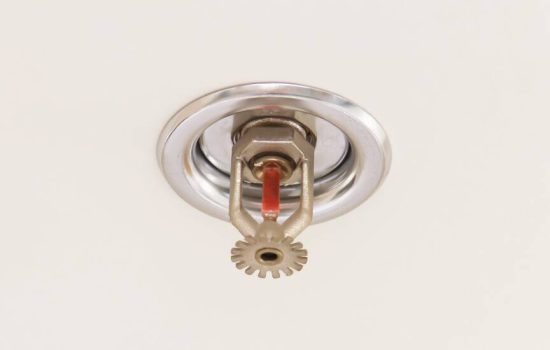The sudden activation of fire sprinklers can be a panic-inducing experience, but these sprinkler systems for fire protection are designed to save lives and minimise property damage during a fire. If you are wondering what sets off fire sprinklers? This article will provide you with an overview of the most common activation causes. Let’s dive into the details.

What sets off fire sprinklers?
1. Heat
The most common trigger for fire sprinklers is heat. Sprinklers feature a small liquid-filled glass bulb or a metal alloy link that holds a small amount of liquid in place. When heat from a fire reaches a certain temperature, typically between 55 and 75 degrees Celsius, the liquid expands and causes the bulb to shatter or the link to melt. This opens the valve, allowing water to flow out of the sprinkler.
Sprinklers do not activate like shown in the movies. The only sprinkler that will flow water is the one that has heat or damage impacted. Sprinklers release approximately 20 litres of water per second, and designers have configured the systems to provide enough water for at least three sprinkler heads simultaneously. If more sprinklers are activated, the system won’t maintain the necessary water capacity to ensure proper pressure and droplet size for containing or extinguishing the fire.
2. Smoke
While smoke detectors are responsible for alerting occupants to a fire, they do not activate fire sprinklers. However, some sprinkler systems can be designed to respond to smoke as well. This is more common in specialised systems such as those used in museums or data centres.
3. Mechanical Damage
Mechanical damage, such as vandalism or accidental impacts, can also set off fire sprinklers. If a sprinkler head is hit hard enough, the fragile glass bulb can shatter regardless of the temperature.
4. Corrosion or Wear
Fire sprinklers are designed to spring into action only during a fire, but they can develop corrosion or wear over time. This can cause the sprinkler head to malfunction and activate even if there is no fire. Regular maintenance and inspections can prevent this from happening.
5. Malfunctioning Systems
While rare, it is possible for fire sprinkler systems to malfunction and activate due to a faulty valve or faulty wiring or even water pressure. This again attests to the importance of routine maintenance and inspection of fire systems to prevent unnecessary and costly mishaps.
While we often hear about fire sprinklers going off accidentally, it’s worth remembering that a well-maintained and trouble-free system can make all the difference in the event of a fire. By understanding what triggers fire sprinklers and ensuring that your system is functioning properly, you can protect your building and its occupants from the devastating effects of fire. Contact our team to ensure a proper inspection and maintenance regime on your premises.



